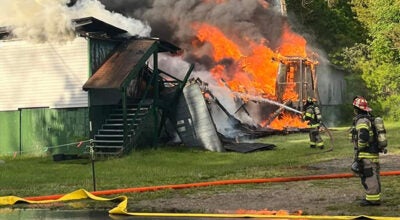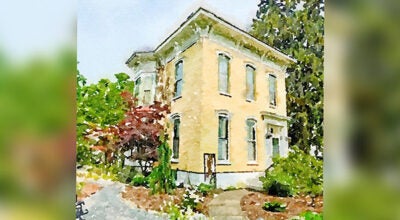SMC’s Ritter auction acquistions preserve 19th century business history
Published 8:00 am Wednesday, November 18, 2009
By JOHN EBY
Dowagiac Daily News
CASSOPOLIS – A treasure trove of 19th century Cass County business records was culled from the Ritter-Kingsbury auction Aug. 29 at the old Edwardsburg fire station.
Steve Arseneau, director of The Museum at Southwestern Michigan College, Tuesday night shared a sampling with the county Historical Society of what will be mounted as an exhibit in spring 2010.
“I took about 2,000 documents home with me that day to preserve these for the public domain,” Arseneau told a capacity crowd at Cass District Library.
Documents have been preserved from every conceivable county community, including Dowagiac (letters hand-signed in the 1870s by Round Oak Stove founder Philo D. Beckwith, Lee Brothers Bank and Dowagiac Manufacturing Co., incorporated in 1881 to make grain drills), Cassopolis, Vandalia, Edwardsburg and Jones, as well as such “pockets of settlement” as Adamsville, LaGrange (Whitmanville), Dailey, Volinia, Penn and Williamsville.
By 1883, Beckwith no longer signed his own correspondence.
He had been joined in business by his son-in-law, Fred Lee.
He’s “dealing with significant sums of money” in the thousands of dollars.
To demonstrate the scope of voluminous papers packing a two-story building “to the rafters,” Arseneau offered a receipt for a one-year Cassopolis Vigilant subscription, which cost $1.50 in 1886.
Some documents are older than that, such as one which still spells the county seat “Cassapolis.”
It took two Diamond Lake men, Steve Saxton and Ed Kresl, six months just to catalog items, including pin-back buttons from the 1920s opening of the Log Cabin Museum on Stone Lake, in preparation for the sale.
Joseph K. Ritter, born in 1829, operated a dry goods, groceries and clothing store in Cassopolis.
Asa Kingsbury was the banker at Cassopolis First National. His daughter married into the Ritter family.
“They were the powerhouse families of Cassopolis,” Arseneau said. “I think the store was across from the post office. The family gets a lot of credit for saving this stuff for 150 years. It’s really unbelievable. The papers are in pretty good condition because of the Ritter’s family efforts and because the paper stock was really good in that era.”
This was only the third auction Arseneau has attended on behalf of the museum, his acquisitions afforded from a fund established when the museum sold the science exhibits to concentrate on local history.
Keith McGrew of Cassopolis also attended the auction.
“That’s the most exciting thing about” the find, Arseneau said, “is that it is a great chronology of businesses in Cass County for 75 years.”
“The important thing we’re going to be able to do is trace the evolution of businesses,” Arseneau said. “People take on partners, divest themselves of partners,” such as the 1880s transition from McIlvain and Rudd to McIlvain, Phelps and Kingsbury (Asa’s son).”
Cassopolis school stuff was one of Arseneau’s quest priorities.
“I’d like to bolster all of our collections for all of the Cass County schools,” he said. “We don’t just collect Dowagiac. We just opened up an exhibit on entertainment and recreation which is very Dowagiac-centric, so we’re trying to bolster our collection” with other communities.
“Cassopolis” encompasses Diamond Lake and the Forest Hall resort, represented by 1882 letterhead. Marcellus had G.W. Jones Exchange Bank, of course, but also the Adjustable School Seat Co. and H.L. Chapman. He went on to own a Cassopolis foundry where he made forges and small engines.
“He moved to White Pigeon for a little while, but I let that lot go. Jones Bank stuff was at the very end four hours later on a Saturday, so Doug Wyant actually bid on that stuff for me,” he said.
There are advertising fliers for Cassopolis Opera House, previously the courthouse and later the Gem Theatre, which introduced “talking pictures” to Cass County 70 years ago.
On May 11, 1898, Cass County sold to George M. Kingsbury its courthouse for $25 with the provision it be moved from its location to make room for the county’s (1899) courthouse.
Moved from State and Broadway to State and Disbrow, it remained until it was razed.
William “Opera House Bill” Jones bought the structure in July 1908 and remodeled it into the Colonial Opera House. He built a 24-foot by 40-foot addition on the rear of the stage.
There were dressing rooms beneath the stage and an orchestra pit in front of it. Seating capacity on the main floor was 420, with 148 seats in the balcony.
The stage had footlights, the ceiling a lighted dome.
Tickets could be bought in advance at Bishop’s store for $1.10 for main floor seating and somewhat less for the horseshoe-shaped balcony.
On June 20, 1929, C.C. Owen announced installation of new equipment to show talking pictures.
Fred Pennell, who became proprietor of the Colonial after Owen, changed its name to the Gem Theatre.
Gerald O’Boyle became the owner and manager in the 1930s and ran the operation until the Gem was torn down in the summer of 1968.
There were two other movie houses in Cassopolis before the Colonial.
The first, owned by Al Anderson between 1909 and 1910, stood where Carter’s Market was in the 1970s.
The second, about the same time, was where the original Ford garage was on N. Broadway. It failed after about a year for lack of community support.
“One of my favorites” appeared to be a handbill tacked on a post which essentially called Asa Kingsbury a liar in retaliation for him depicting two men as “unscrupulous rogues for taking kickbacks from the Michigan Central Railroad Co. This is their rebuttal to that,” Arseneau said, noting this 1854 sheet is the one which spells it “Cassapolis.”
“This is the only original document we have in our collection” with that early spelling, he said.
SMC procured 1950s Ranger high school football programs and a Cassopolis Union School item indicating the Class of 1879 consisted of two graduates. A teachers’ institute started about the same era.
In 1873, four pounds of nails sold for 24 cents at a hardware store.
Stove parts were a frequent purchase.
The county seat had both the Cassopolis Elevator Co. and the Cassopolis Milling Co., the Goodwin Hotel and Stemm Department Store.
“There were several tables of just ledgers,” he said. “They went for about $100 to $150 a stack,” although “a couple of weeks ago, for example, I got a call from a lady who is an antique books dealer in New York City. She had a couple of Cassopolis ledgers from this auction she tried to sell to me for $600 a piece.” McGrew saw a couple sell on the Internet for $179 each.
Ledgers included Cassopolis Manufacturing Co., First National Bank and the Goodwin Hotel.
Land grants signed by President Andrew Jackson went for $750 each, although they were for parcels in Leelanau County.






